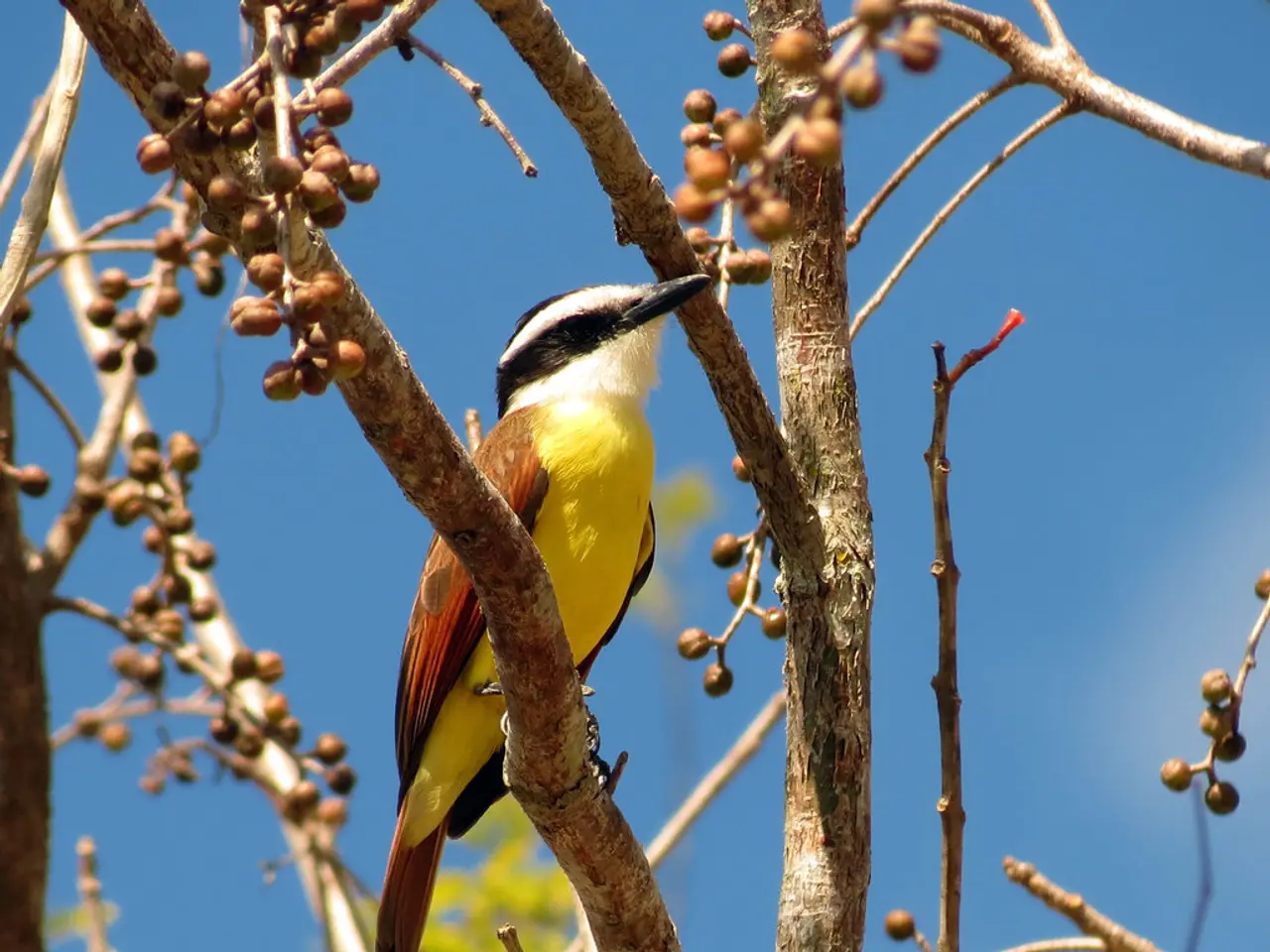Kitchen-Friendly Bird Feeding: Discover 10 Delights Birds Adore and 5 Foods to Avoid
In the spirit of nurturing and supporting the diverse array of wild birds that visit our backyards, it's essential to offer foods that are both safe and nutritious, while steering clear of harmful items. Here's a comprehensive guide to what kitchen foods are beneficial and what should be avoided for different types of wild birds:
### Safe and Beneficial Foods for Backyard Birds
1. **Sunflower Seeds (especially sunflower hearts)**: Rich in oils and energy, sunflower seeds are a popular choice for most garden birds, providing essential calories and high fat content.
2. **Mealworms**: A high-protein food source, mealworms are especially loved by insect-eating birds like robins and wrens, particularly during the nesting season.
3. **Fat Balls and Suet**: These provide high-energy fat content, ideal for cold weather when birds need extra calories to maintain body heat.
4. **Peanuts**: High in oils and energy, peanuts should be served unsalted and in a mesh feeder to prevent choking and spoilage.
5. **Seed Mixes**: A variety of premium seeds, including “No Grow” mixes and high-energy seed blends, help attract a broad range of birds and provide balanced nutrition.
6. **Nyjer Seed**: This tiny seed is favoured by finches such as goldfinches and siskins due to its small size and high oil content.
7. **Soft Foods for Ground Feeders**: Kibbled sunflower and insect-rich mixes are ideal for fledglings and ground-feeding birds, providing accessible nutrients.
8. **Plain, Cooked Human Foods**: Some human foods such as plain cooked rice, oats, or chopped fruits can be offered occasionally, but always in small amounts and without seasoning.
9. **Water**: Fresh, clean water is essential for hydration, bathing, and digestion. Use shallow dishes or bird baths and refill regularly to keep water clean and safe.
### Foods and Items to Avoid
1. **Salted or Seasoned Foods**: Salt is harmful to birds, so avoid salted nuts or any seasoned human foods.
2. **Bread**: Bread lacks nutritional value and can be harmful if it moulds or fills birds without providing needed nutrients.
3. **Raw Peanuts**: Avoid raw peanuts as they can carry harmful fungi; only offer shelled, unsalted peanuts meant for birds.
4. **Processed or Sugary Foods**: Avoid sweets, processed snacks, or any food with artificial additives and preservatives.
5. **Foods with Pits or Seeds that are Toxic**: For example, apple seeds contain cyanide and should be avoided.
6. **Large Pieces of Food**: All food should be cut into manageable pieces to prevent choking, especially for smaller birds.
---
**Summary Table**
| Category | Safe Foods | Foods to Avoid | |-----------------------|---------------------------------------------|---------------------------------------| | Seeds & Nuts | Sunflower hearts, unsalted peanuts, nyjer | Salted nuts, raw peanuts | | Protein Sources | Mealworms, insect-rich mixes | Processed meats, unapproved animal foods | | Fat & Energy | Fat balls, suet pellets | Salted or flavoured fat products | | Human Foods | Plain, cooked rice/oats, chopped fruits | Bread, seasoned foods, sugary snacks | | Water | Fresh, clean water in shallow dishes | Stale or contaminated water |
By providing a varied diet with these safe foods, you can attract and support a wide range of backyard birds while keeping them healthy and thriving year-round.
Additional resources are available for learning more about taking care of wild birds, such as 32 tips for taking care of wild birds and 32 nutritious things birds can eat besides bird food, as well as information on whether to help a baby bird.
For instance, apples can be served to birds by slicing them up, removing the seeds, and offering them on a tree stump or feeder (especially for hummingbirds, which can be attracted by filling apple halves with sugar water). Bananas can be offered to birds by removing the peel, chopping them into rounds, and placing them on a tree stump or skewer.
By offering these safe and nutritious foods, you can create a thriving environment for wild birds in your backyard, fostering a connection with nature and contributing to the overall health and well-being of these fascinating creatures.
- Owning a pet doesn't only refer to dogs and cats; various species of birds can also make delightful companions, given proper care, nutrition, and lifestyle.
- Home-and-garden stores often stock food-and-drink items that cater to backyard pets, such as seeds, nuts, and mealworms, ensuring their health and well-being.
- Much like we have to be aware of the nutrition content and benefits of our own food choices, providing treats that are rich in energy and essential nutrients is crucial for maintaining a pet dog's health.
- Cats also need balanced nutrition, and that's why it's essential to choose high-quality cat food that meets their dietary needs and promotes a long, healthy lifestyle.
- Establishing a home-and-garden space that includes a birdbath, food-and-drink feeders, and birdhouses can contribute to the well-being of not only pets but also wild birds in your neighborhood.




